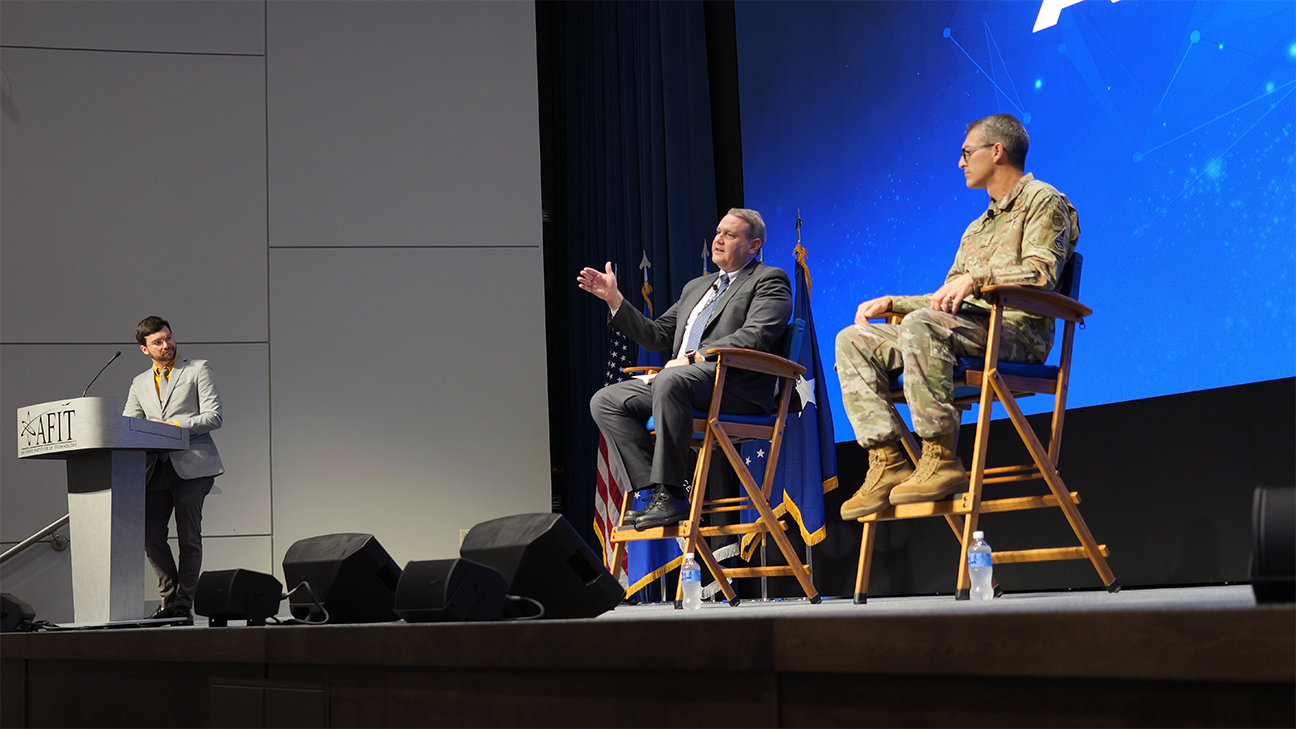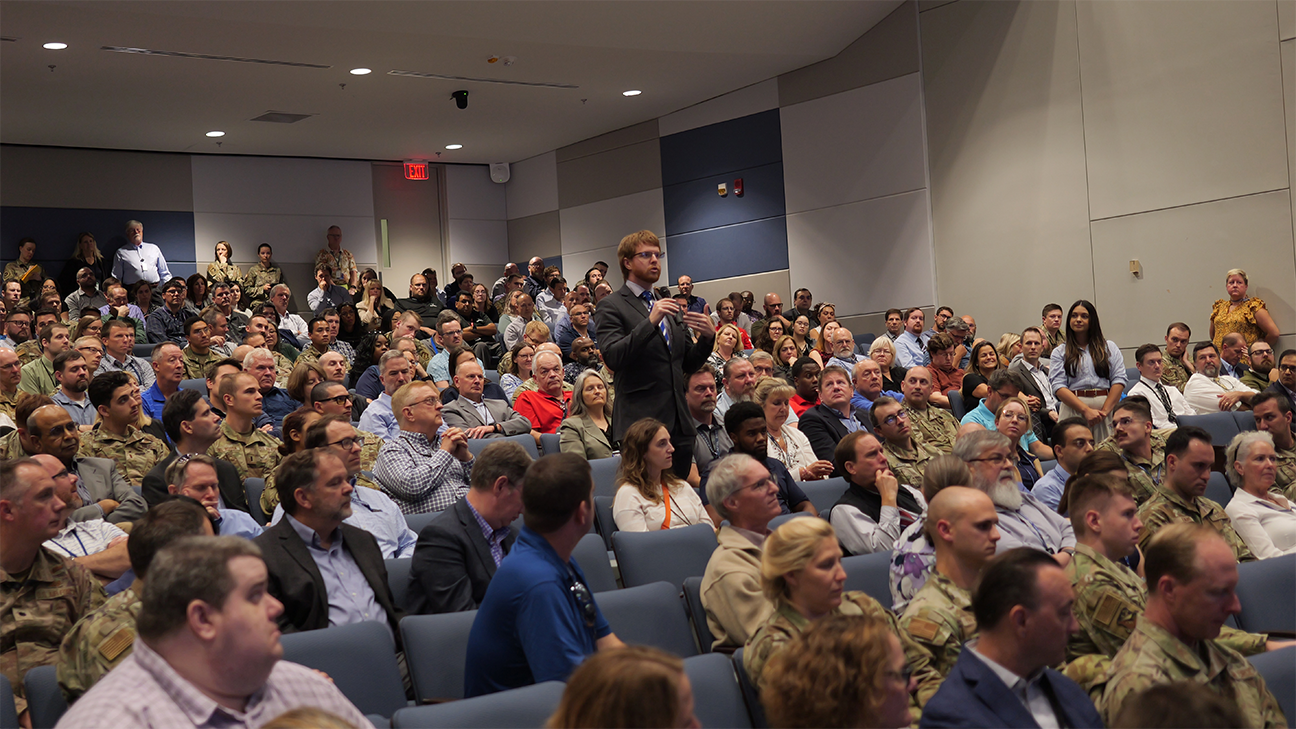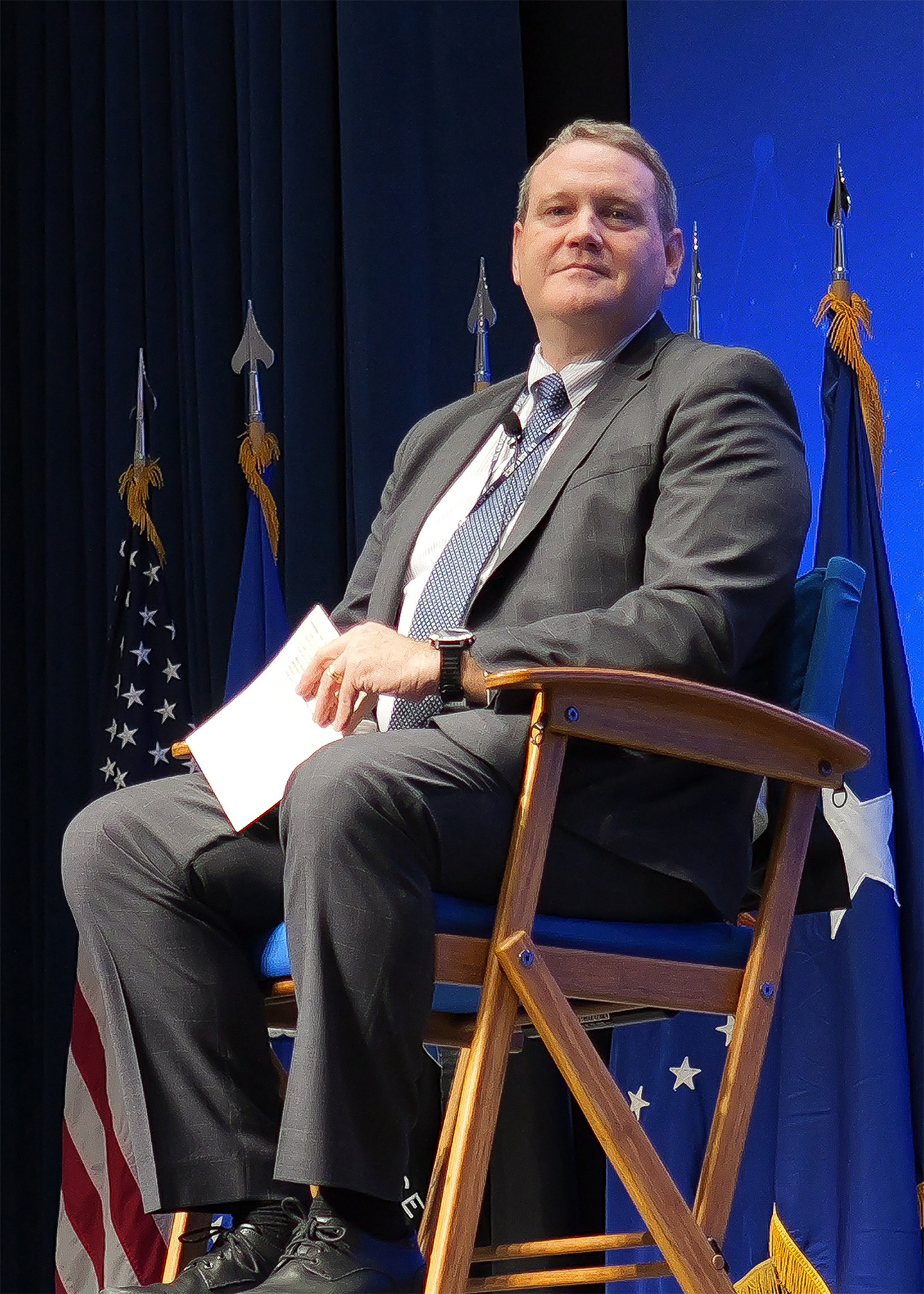WRIGHT-PATTERSON AIR FORCE BASE, Ohio (AFRL) – Andrew P. Hunter, assistant secretary of the Air Force for acquisition, technology and logistics, hosted a town hall meeting with Brig. Gen. Scott A. Cain, commander, Air Force Research Laboratory, or AFRL, Sept. 14, 2023, at the Air Force Institute of Technology’s Kenney Hall Auditorium, Wright-Patterson Air Force Base, Ohio.
Cain welcomed Hunter and the two senior leaders transitioned discussion to their shared vision concerning the Department of the Air Force’s future priorities.

Andrew P. Hunter, assistant secretary of the Air Force for acquisition, technology and logistics, discusses his intent and priorities for the Air Force Research Laboratory, or AFRL, workforce during a town hall with Brig. Gen. Scott A. Cain, AFRL commander, Sept. 14, 2023, at the Air Force Institute of Technology’s Kenney Hall Auditorium, Wright-Patterson Air Force Base, Ohio. (U.S. Air Force photo / Keith Lewis)
“My overall intent is to advance warfighting with [science and technology, or S&T] to win the strategic competition,” Cain said. “I’ve said we’re going to drive the fight and that means … we’re going to look at the priorities of the Department of the Air Force and we’re going to drive tech solutions for those priorities because we want to be ready for the fight that’s in front of us.”
Building this foundation and driving advantages for the future fight are included in Cain’s overall intent, he said.
“When I say drive the fight, it’s drive hard right now because we’re in a great power competition and strategic competition,” he added.
Cain’s intent also centers around the motto “One Lab, One Fight,” and differs slightly from that of AFRL’s previous commander, Maj. Gen. Heather J. Pringle, who prioritized “One Lab, Two Services” in an effort to highlight both U.S. Air and Space Forces.
“We are, ‘One Lab, Two Services,’ but we’re building on that because we need to execute our solutions,” Cain said.
While focusing on Air Force and Space Force solutions, Cain said that DAF leadership, Airmen and Guardians must concentrate on the joint fight and multidomain solutions.
“It requires us to do business a little bit differently, but ‘One Lab, One Fight’ is really what is going to enable us to have the solutions that we need, the capabilities that we need for that fight,” he added.
Lastly, Cain said the people in these organizations are vital.
“Our real competitive advantage here is our people,” he said. “That’s our core competency – building people, people who generate the solutions, people who fix the airplanes, people who fly the airplanes across the board. Our people are our advantage.”
Part of Cain’s intent is to build the best S&T workforce and give people the modern digital tools they need as part of the digital transformation to execute the mission and drive the fight.

An attendee directs a question to Andrew P. Hunter, assistant secretary of the Air Force for acquisition, technology and logistics, during a town hall with Brig. Gen. Scott A. Cain, commander, Air Force Research Laboratory, or AFRL, Sept. 14, 2023, at the Air Force Institute of Technology’s Kenney Hall Auditorium, Wright-Patterson Air Force Base, Ohio. (U.S. Air Force photo / Keith Lewis)
Aligning messages
Cain said his intent aligns with Hunter’s, as well as that of Gen. Duke Z. Richardson, commander, Air Force Materiel Command.
“It aligns very well with [their] priorities, so well that I can execute our labs’ priorities through AFMC, and they support all of us,” Cain said. “We’re all very strategically aligned here and those concepts that I’m articulating resonate very directly with both of your priorities.”
Hunter is responsible for and oversees, Air Force research, development and acquisition activities totaling an annual budget of more than $60 billion for over 550 acquisition programs. In this position, he serves as the principal adviser to the secretary of the Air Force and the Air Force chief of staff for research and development, test, production and modernization efforts within the Air Force.
Hunter reiterated that the three leaders have worked hard to align their three sets of priorities.
“They are not identical because our roles are a little bit different, but they are synced and integrated and complementary with one another, and that’s always our intent,” Hunter said.
Hunter stressed the importance of AFRL’s defense efforts and accomplishments.
“I cannot envision us having success in the missions that the Department of the Air Force has been tasked to do in the next five to 10, 15, 20 years and beyond without the work of the Air Force Research Lab,” Hunter added. “Many of the major advances over the last 50 years have had at least a part or some role of work that originated at AFRL, and a lot of them are substantial because of work at AFRL.”
Hunter said he anticipates the same for decades to come.
“We need every ounce of S&T advancement, technology, transition that you can possibly deliver,” he said. “We’re intensely interested in your work, and it’s for that vital reason – the work you do ties directly into National Defense strategy and into our vision for the future of the Department of the Air Force.”
Regarding the “One Lab, Two Services” or “One Lab, One Fight” approaches, Hunter said to be successful over the next decade, the lab’s work is vital to the success of the Air and Space forces.
Vision for the future
During the Air and Space Force Association 2023 Air, Space and Cyber Conference, Hunter reiterated Department of the Air Force Secretary Frank Kendall’s intent to reoptimize for great power competition and conflict.
Hunter said leaders plan to remain in sync with Kendall’s operational imperatives and that preparation is the key to success for future missions.
Considering the tasks that fall under the operational imperatives umbrella, as well as other initiatives, Hunter said AFRL has succeeded in many areas, but there is room for improvement.
“This new initiative is an opportunity to get at structural issues, organizational issues, … policy issues [and] … barriers,” Hunter said. “This is our opportunity to really get after that because there’s no stone that can’t be turned as part of this initiative.”
Lastly, Hunter expressed the importance of people and digital engineering, as AFRL advances the mission forward.
“One of my priority areas is ensuring that we have the workforce: the acquisition workforce we need, the S&T workforce that we need with the right skills,” he added.

Andrew P. Hunter, assistant secretary of the Air Force for acquisition, technology and logistics, discusses his intent and priorities during a town hall with Brig. Gen. Scott A. Cain, commander, Air Force Research Laboratory, or AFRL, for the AFRL workforce Sept. 14, 2023, at the Air Force Institute of Technology’s Kenney Hall Auditorium, Wright-Patterson Air Force Base, Ohio. (U.S. Air Force photo / Keith Lewis)
About AFRL
The Air Force Research Laboratory, or AFRL, is the primary scientific research and development center for the Department of the Air Force. AFRL plays an integral role in leading the discovery, development and integration of affordable warfighting technologies for our air, space and cyberspace force. With a workforce of more than 12,500 across nine technology areas and 40 other operations across the globe, AFRL provides a diverse portfolio of science and technology ranging from fundamental to advanced research and technology development. For more information, visit www.afresearchlab.com.
